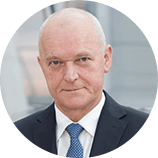Corporate governance and ethics
Authorities of the company
The sole shareholder of PSE is the State Treasury whose powers are exercised by the Government Plenipotentiary for Strategic Energy Infrastructure
GRI 102-18, GRI 102-22 Corporate oversight over the company's activities is exercised by the Supervisory Board appointed in accordance with the Articles of Association by the General Meeting acting through the Government Plenipotentiary for Strategic Energy Infrastructure.
The competence of the Minister in Energy covers matters related to energy security of the country, including the security of supply of energy, energy resources and fuels, as well as energy infrastructure, the operation of power systems, in line with the principles of rational economy and the needs of the country’s energy security.
Composition of the Supervisory Board
as at the date of the report
(link to Glossary)
Tomasz Dąbrowski
Chairman
Paweł Łatacz
Deputy Chairman
Marcin Czupryna
Secretary
Rafał Gawin
Member
Zbigniew Kochański
Member
Adam Piotrowski
Member
Changes to the Supervisory Board
Composition of the Management Board
as at the date of the report
(link to Glossary)

Eryk Kłossowski
President of the Management Board

Jarosław Brysiewicz
Vice President of the Management Board

Jakub Kozera
Vice President of the Management Board

Tomasz Sikorski
Vice President of the Management Board
Changes in the Management Board

Organisational structure
as at the date of the report
(link to Glossary)
PSE S.A. Management Board
Eryk Kłossowski
President of the Management Board
Jarosław Brysiewicz
Vice-President of the Management Board
Jakub Kozera
Vice-President of the Management Board
Tomasz Sikorski
Vice-President of the Management Board
Management Board Department
Security Department
ICT Department
Communication Department
Risk Management Office
Legal Office
Supervision Office
Work Environment Management Office
Maintainance Department
Technical Standards Department
Human Resource Management Department
Purchasing Department
Planning and Controlling Department
Accounting and Finance Department
Administration Department
Central Investment Unit
System Development Department
System Operation Department
Transmission Department
International Cooperation Department
Energy Metering Office
As a result of organisational changes in our company, a new structure was adopted on 1 May 2017. There are 20 organisational units and the Central Investment Unit at PSE.
Presented below are the main changes resulting from the new organisational structure
We have implemented the new Investment Implementation Model
that ensures the effective implementation of the investment process for the construction, expansion and upgrade of grid assets. We have also established a specialised Central Investment Unit.
We have set up separate organisational units
responsible for compliance and legal support, internal audit, energy measurements and settlements, and technical standards.
In place of the OHS and Fire Protection and the Environmental Protection Section of the Maintenance Department, we have established the Work Environment Management Office
which performs legal compliance tasks in the field of OHS, fire protection, and in the course of investment projects, as well as the implementation of best practices in HSEQ
We have incorporated organisational units
liquidated at the branch level in our head office structure.
We have established seven new committees
Investment, Standardisation, Security, Data Governance, Innovation, REMIT, and Network Codes Implementation.

Sustainable development management
Learn about 3 levels of sustainable development management (SZZR) in our company
Strategic level
PSE Management Board
Management level
Sustainable Development Committee, executive and management staff or PSE organisational units.
Operational level
Sustainable Development Team, representatives of PSE organisational units (experts and indicator coordinators)
Risk Management
GRI 102-15 Active risk management is an important element of our company's activities. In 2016, we established a dedicated organisational unit responsible for Risk Management. The review of risks carried out according to the new methodology showed that the key risks facing our company include:
- risks of loss of continuity of electricity supply;
- operational risks related to network operation and maintenance, and PPS balancing;
- risks related to threats to the implementation of investment projects;
- risks related to cyber security and IT infrastructure;
- regulatory risks resulting from possible implementation of certain EU regulations under the Clean Energy for All Europeans package.
GRI 102-11
Our approach to risk management
We have implemented a new approach to risk management, resulting in the first Risk Review based on a proprietary methodology developed in our company. The review, carried out at the end of 2016, made it possible to define the clear objectives of risk management in PSE. We present them below.
- identification, description and quantitative assessment of the risks of the activities performed;
- selection of methods and tools that reduce the probability of occurrence and minimise negative risk effects or increase the probability and maximise positive risk effects;
- keeping risk within predefined, acceptable limits.
The first stage of risk management in our company is the identification of risks, which includes:
- identification of possible causes and definition of the frequency of their occurrence, and the probability of conditional materialisation of risk after the occurrence of a specific cause;
- identification of effects, defined as negative and positive consequences of the materialisation of risk, and representing them in a numerical or descriptive manner in four dimensions: financial/physical, PPS operation continuity and quality, image/legal, and impact on health and life. Each effect has a numerical value assigned to it with the use of predefined scales;
- identification of interdependences between risks, in particular cascading risks, i.e. situations where the materialisation of risk generates another risk;
- calculation of the metrics of individual risks, representing sums of products of the expected frequency of materialisation of all causes of the risk concerned – adjusted by the conditional probability of risk materialisation and multiplied by all effects of the risk expressed in numbers.
The second stage is the preparation and implementation of a risk management plan executed by the different organisational units and the monitoring or its performance.
In principle, risk management measures must be economically acceptable and take into account the need to maintain the required level of PSE's operation security.
In 2016, we started or planned a range of new measures related to risk management in our different business areas. They concerned:
- the development of a methodological approach and criticality/materiality scoring of the PPS infrastructure elements, which has already become a basis for prioritisation of repairs and will be applied in the planning of repairs in a multi-annual cycle, maintenance planning, and the development of standards for solutions used at electrical substations;
- the development of a new risk management standard for investment contracts, which includes combining contractual sanctions with key needs of our company, performance guarantee, insurance requirements, payment schedule, as well as work progress monitoring methods;
- PPS network operation procedures and tools in the emergency mode;
- analyses and day-to-day monitoring of PSE's financial exposure resulting from the operation of balancing market mechanisms;
- monitoring the risk of PPS imbalance by launching a tool for the estimation of stochastic operating power reserve;
- the PSE risk insurance model.
In risk management, we use the professional IR tool myRisk.com, developed by PSE GC specialists, which is regularly upgraded and tailored to current needs.
We also analyse our impact on the natural environment and take measures to reduce negative impact while pursuing initiatives that have a positive impact. Risk management is part of each certified management system in place at the company.
Presented below are our management systems in place at PSE
Energy Management System according to ISO 50001
PN-EN ISO 14001:2005 Environmental Management System
PN-ISO/IEC 27001:2007
Information Security Management System
BS 10500:2011 Corruption Risk and Abuse Prevention System
PN-EN ISO 22301:2014-11 Business Continuity Management System
PN-N-18001:2004 Occupational Health and Safety Management System
The highest values
GRI 103, GRI 102-16
Our company builds its vision and mission on three values
Dependability
PSE is a dependable partner for electricity customers and generators, distribution system operators, market operators, power exchanges, social partners, the regulatory authority, and the Government of Poland.
Reliability
Activities carried out by PSE confirm the company’s competence in performing its duties and fulfilling its mission.
Responsibility
PSE cares about future generations, the natural environment, energy security of the country, and the position of Poland’s economy in the world.
Building business relations and partnerships
Legal regulations
GRI 103 Our purchasing policy is pursued in compliance with the provisions of the Act of 29 January 2004 – Public Procurement Law (hereinafter: PPL Act) and relevant implementing measures, as well as the Procurement Rules of PSE S.A. (hereinafter: the Rules) and the procedure laid down in the CJI Special Conditions of Procurement. In compliance with the PPL Act, our company awards utilities contracts for a value equal to or exceeding the value representing the zloty equivalent of the net amount of: EUR 418,000 for supply contracts and EUR 5,225,000 for works contracts. Below those amounts, PSE and all organisational units of our company apply the Rules.
Contract award procedures
A detailed method of procurement is defined by the provisions of the PPL Act, the PSE Contract Award Rules and the CJI Special Conditions of Procurement.
- fair competition,
- impartiality and objectivism,
- equal treatment of contractors,
- transparency.
The principles are fundamental rules of public and non-public procurement, and arise from the provisions of the PPL Act and the Contract Award Rules.
The contracting authority complies with the above principles both in the preparation phase and in the course of the contract award procedure, preparing the terms of reference and appointing the tender evaluation committee. The obligation to comply with the principles also rests on the contracting authority in the course of the procedure.
Activities related to the preparation and conduct of the contract award procedure are performed by persons who ensure impartiality and objectivism.
Fair competition principle
Equality principle
Transparency principle
Fair competition principle
The principle of fair competition is the foremost rule in managing tendering procedure and awarding contracts. It provides each interested party with equal access to information on contracts and to contracts themselves. The principle concerns, among other things, a description of the conditions of participation in the procedure, the method of delivery of statements, applications, notices and information.
Sometimes tendering procedures impose a minimum number of potential contractors, ensuring compliance with the fair competition principle.
What is more, the description of the object of the contract must be prepared in an unambiguous and exhaustive manner, by means of precise and comprehensible statements, taking into account all requirements and circumstances that may affect the tender preparation process.
The conduct of the procedure in a manner that guarantees fair competition requires compliance with the rules set forth below.
- Many contractors should be allowed to participate in the procedure unless prerequisites arise for contract award on a single-source basis.
- The specification of requirements should guarantee access to a contract only for reliable contractors.
- Contract terms should allow contractors to prepare a competitive tender.
The fair competition principle applies also to contractors. Therefore, the submission of a tender representing an act of unfair competition is for the rejection of a tender.
Equality principle
The principle of fair competition is inseparably connected with the equality principle, also referred to as the principle of equal treatment of parties seeking contract award.
According to the principle, all contractors should be treated equally, with identical criteria applied to everyone. The contracting authority may not apply requirements that give preference to a particular contractor. Compliance with the principle of equal treatment consists, in particular, in applying the same measure to all contractors, i.e. the same requirements, the same verification of compliance with the requirements, and their consistent enforcement.
In the terms of reference, the contracting authority sets forth the conditions for participation in the procedure which refer to the object of the contract (object-specific), manner of contract performance (contractual), and the contractor's experience and personnel (subject-specific). It should also specify how contractors are expected to confirm compliance with requirements. Upon receipt of tenders, the contracting authority verifies contractors' compliance with requirements and takes contract award decisions according to the results of such evaluation.
The conduct of the procedure in a manner that guarantees equal treatment of contractors requires compliance with the rules set forth below.
- Requirements should be specified in the same manner for all contractors interested in winning a contract.
- The method of confirming compliance with requirements should be the same for all contractors.
- Compliance with the conditions for participation should be examined by comparing information and documents submitted by the contractor with those required.
The rules apply both at the stage of putting forth conditions for participation in the procedure, and during the evaluation of tenders or selection of the most advantageous tender. What is more, the equality principle means a ban on the discrimination of contractors on grounds of their legal status, location and characteristics.
Transparency principle
Transparency means clear and unambiguous rules of the game.
One of the requirements furthering the principle of transparency is the openness of the procedure, i.e. providing access to information on equal terms to all interested participants, as well as maintaining maximum impartiality and objectivism in taking each action.
Contracts awarded
GRI 102-9 PSE cooperates with a large group of contractors and suppliers, taking care of social responsibility standards. In 2016, our company awarded contracts for investment projects, supply of goods and services to 292 suppliers for the total amount of PLN 2 217,009,457.22.
Main groups of PSE suppliers
- Contractors for new build, upgrade and repair projects performing work on grid assets.
- Equipment and hardware suppliers and service providers.
